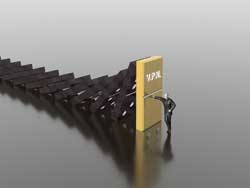FACED with the prospect of security threats and ever-changing federal regulations, many airports have been stymied in the quest to enhance the safety of air travel. Fortunately, the evolution of the Transportation Worker Identification Credential program provides a useful guide that airports can confidently follow without fear of technology obsolescence.
- By Roger Roehr
- Jul 16, 2007

CRITICAL infrastructure organizations, including airports, seaports, energy manufacturing facilities and telecommunications networks, are essential to functioning of societies and economies.
- By Mariann McDonagh
- Jul 06, 2007

NATIONAL identification cards were being promoted long before the terrorist attacks of Sept. 11, 2001, as a means to identify potential terrorists, curb illegal immigration and thwart criminal activity. Countries around the world are already using national ID cards. Singapore recently implemented Singapore Personal Access, or “SingPass,” an ID used for e-government services. Germany uses an encrypted biometric national ID. Malaysia established “Mykad,” a universal-purpose ID card, and no less than a dozen other countries have issued contracts to develop the infrastructure to support a national ID card.
- By Col. Timothy D. Ringgold
- Jul 02, 2007

ANYWHERE in the world, most security and intelligence officers will agree that transportation security is about managing risk. It's about detecting potential threats as early as possible, reacting appropriately and mitigating the ripple effects, all the while focusing on simplifying travel for billions of passengers who do not warrant concern.
- By Matthew Finn
- Apr 13, 2007

FROM Barcelona to Berlin and all across Europe, workers today need to access corporate information outside the workplace. Remote access frees workers from the restrictions of the corporate work environment. By working from any location and at any time, employees can collaborate more effectively, work more efficiently and ultimately be much more productive.
- By Steve Neville
- Apr 13, 2007
- By Col. Timothy D. Ringgold
- Apr 01, 2007

A heightened sense of awareness of threats that face the United States has placed ongoing pressure at a national, state and local level to keep citizens safe from terrorism, as well as natural disasters and other unplanned events.
- By Tony Lapolito
- Mar 12, 2007

THE security industry has a long and proud history of working side by side with the government to develop new technologies that result in an improved way of life for Americans. While commercial security products and practices have deep affiliation with both government applications, military and non-military, a new breed of security concerns gave birth to new security requirements and solutions–especially those pertaining to border control.
- By Erin Phelps
- Mar 12, 2007

A few hours after taking control of Congress and following 12 years of Republican dominance, House Democrats announced a plan they say will strengthen homeland security. Accusing Republicans of neglect, Democrats on the Homeland Security Committee say their plan will implement the unfinished 9/11 Commission recommendations; require private companies to prepare for terrorism; require the government to inspect cargo on passenger planes; and require all cargo containers carried on ships to be scanned and sealed before leaving for an American port.
- By Col. Timothy D. Ringgold
- Mar 05, 2007

TO a significant extent, shrink can be predicted and tamed with targeted security resources, institutional awareness and effective, operationally feasible countermeasures.
In statistical analysis, the goal is to explain variation and to determine what part of that variation is systematic and predictable.
- By Steven K. Aurand, Jon D. Groussman
- Mar 02, 2007

NAVIGATING the world of federal government contracts can be a head-spinning operation for even the most committed and headstrong business.
But for many, working with the federal government, especially with the constantly growing Department of Homeland Security, is too big a proposition to pass up. With 183,000 employees and a budget of more than $42.7 billion in fiscal year 2007, DHS is the third-largest cabinet department in the federal government and a target for many companies to garner new business.
- By Brent Dirks
- Feb 05, 2007